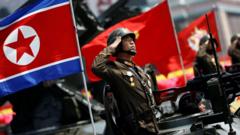In a tightly controlled ballot, Aleksandr Lukashenko continues his iron-fisted reign, leaving opposition decimated and dissent quashed.
Lukashenko Secures Seventh Term in Controversial Belarus Election

Lukashenko Secures Seventh Term in Controversial Belarus Election
Belarusian leader's re-election seen as a maneuver to consolidate power amid allegations of electoral fraud.
In a continuation of his long-standing rule, Belarus's President Aleksandr G. Lukashenko has claimed victory in his seventh consecutive presidential election, a result critics describe as a mere facade to solidify his autocratic regime. Observers noted that the election process appeared heavily staged, with many opposition figures either imprisoned or exiled, effectively silencing dissent.
Following the polls on Sunday, state media reported Lukashenko received an overwhelming 87.6 percent of the vote, a rise from his alleged 81 percent in the contested 2020 election. Svetlana Tikhanovskaya, a principal opposition leader who was forced to flee the nation post-2020 protests, condemned the election process, dubbing it a "farce" crafted to maintain Lukashenko's grip on power.
This year's election featured only government-approved candidates, creating a skewed political landscape. Despite four rivals technically participating, they collectively secured less than 2 percent of the votes, signifying a broader context in which dissent is quashed and the media remains tightly controlled by the state.
Lukashenko's election comes at a time when he is keen to demonstrate stability following the political chaos of 2020, a period marked by public demonstrations against his regime. The result, while anticipated, allows him to present a veneer of legitimacy both to the Belarusian populace and his ally, Russian President Vladimir V. Putin, further entrenching his autocratic rule in Eastern Europe.
Following the polls on Sunday, state media reported Lukashenko received an overwhelming 87.6 percent of the vote, a rise from his alleged 81 percent in the contested 2020 election. Svetlana Tikhanovskaya, a principal opposition leader who was forced to flee the nation post-2020 protests, condemned the election process, dubbing it a "farce" crafted to maintain Lukashenko's grip on power.
This year's election featured only government-approved candidates, creating a skewed political landscape. Despite four rivals technically participating, they collectively secured less than 2 percent of the votes, signifying a broader context in which dissent is quashed and the media remains tightly controlled by the state.
Lukashenko's election comes at a time when he is keen to demonstrate stability following the political chaos of 2020, a period marked by public demonstrations against his regime. The result, while anticipated, allows him to present a veneer of legitimacy both to the Belarusian populace and his ally, Russian President Vladimir V. Putin, further entrenching his autocratic rule in Eastern Europe.




















